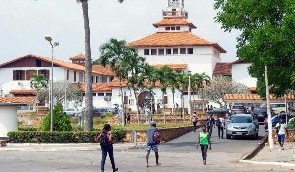- Financial Times proclaims, citing power unreliability, cost of business, slow decision making, bloated gov?t, graft
The Financial Times (FT) of London, in a report on Ghana in its last Tuesday, November 1, 2005 edition seems to be giving Ghanaians a feedback on what the outside world makes of our environment as an investment destination. ording to the FT?s expos?, the ?Golden Age of Business,? proclaimed by President Kufuor upon assumption of office has ?failed to materialize as rapidly as many had hoped.?
The reasons cited as accounting for the small foreign investment, in spite of our efforts, include ?high business costs and problems such as land tenure.? It continued that ?since most land is vested in local chiefs, transactions are often messy and uncertain.?
The report indicts us on the state of our infrastructure, pointing out ?Facilities such as power, water, ports and roads (as being) badly (in) need upgrading.? The dampening of the celebration of the Black Stars? qualification for the 2006 World Cup, was cited by the FT to emphasise the unreliability of power.
It continued that, ?Embarrassingly, the triumph of Ghana?s national soccer team last month in qualifying for the first time, for the final stages of next year?s World Cup in Germany was marred to a nationwide blackout.?
The paper reports also that ?Development partners complain of slow decision-making by government on big projects, and a reluctance to cut back the country?s bloated civil service?, adding that it ?discovered while preparing this report, Ghanaians bureaucracy can, when it chooses, be as officious and obstructive as any on the continent.
The report acknowledges that ?Legislation on government procurement and financial management has reduced the scope of abuses.? It however pointed out that ?many say that, despite Mr. Kufuor?s anti-corruption platform, low-level graft has continued and possibly increased? with his opponents accusing him of ?despotism and ethnic favoritism.?
Ghana is cited by the report as having emerged as a pacesetter for recovery and standards of governance since the economic collapse of the 1980s.
Ghana is cited as ?beloved of aid workers and a favoured destination for assistance from the UK and elsewhere,? with mention of benefits from debt relief and expected write-offs, while ?donors, almost as much as the government, are anxious to portray it as a star performer.
The recent period of stability, is described as unprecedented since independence and exceptional in tropical Africa.
Even though the country?s economic stability is lauded, it is mentioned also as a source of frustration, with its performance ?falling short of its promise.?
The report has it that ?many Ghanaians see little or no visible improvement in living standards, with the Government ?searching for ways of attaining a higher growth plateau.?
The economy is described as looking like any ?classic post-colonial African economy, depending on a few commodities, with cocoa, gold, timber accounting for three quarters of exports.
On the apparent growth barrier, the FT states it is subject to different interpretations and asks: ?Is it because the free-market reforms that have been prescribed are the wrong medicine? Or is it that the dose has not been large enough??
With much of West Africa recovering from civil wars, Ghana is touted as standing tall as a credible mediating force.
On the political climate, the report states, ?discontent among young urban dwellers now looms as potentially Ghana?s biggest political risk? adding that ?some of those who originally voted for Mr. Kufuor are bitterly disillusioned. Last December?s election was not the walkover many expected.?
Indicating the arduous task ahead of the New Patriotic Party (NPP), at the end of President Kufuor?s term, the report states, ?whoever his successor as candidate is in 2008, it would not take much for an upset. In common with a number of others in Africa, Ghana?s government is struggling with popular expectations it created when it was elected to power and has so far been unable to meet.?
The impact of stronger recent growth is mixed, and in some areas barely discernable, the FT states.
Figures for extreme poverty show Ghana on course to meeting the target set under the UN?s Millennium Development Goals halving the 1990 rate by 2015.
But some indicators for health and nutrition have been getting worse, with an increase in infant deaths between 1998 and 2003. The government is in the process of pioneering a mandatory national health insurance scheme funded from contributions and earmarked value-added taxes, which will make treatment available without payment.
But UN officials say that on present trends Ghana will miss its MDC health targets. The country has been losing more than half its doctors to the brain drain.
Money is flowing back from members of Ghana?s diaspora, reckoned to number 3m. But, amid signs of conspicuous middle-class spending, the perception among many ordinary people is that they are no better off.
On Agriculture: An ability to transform its farming base will determine whether the country can achieve sustainable growth beyond the support of donors.
The North: This largely Muslim region bears witness to the failure of aid and regional policies to redress the economic imbalance.












